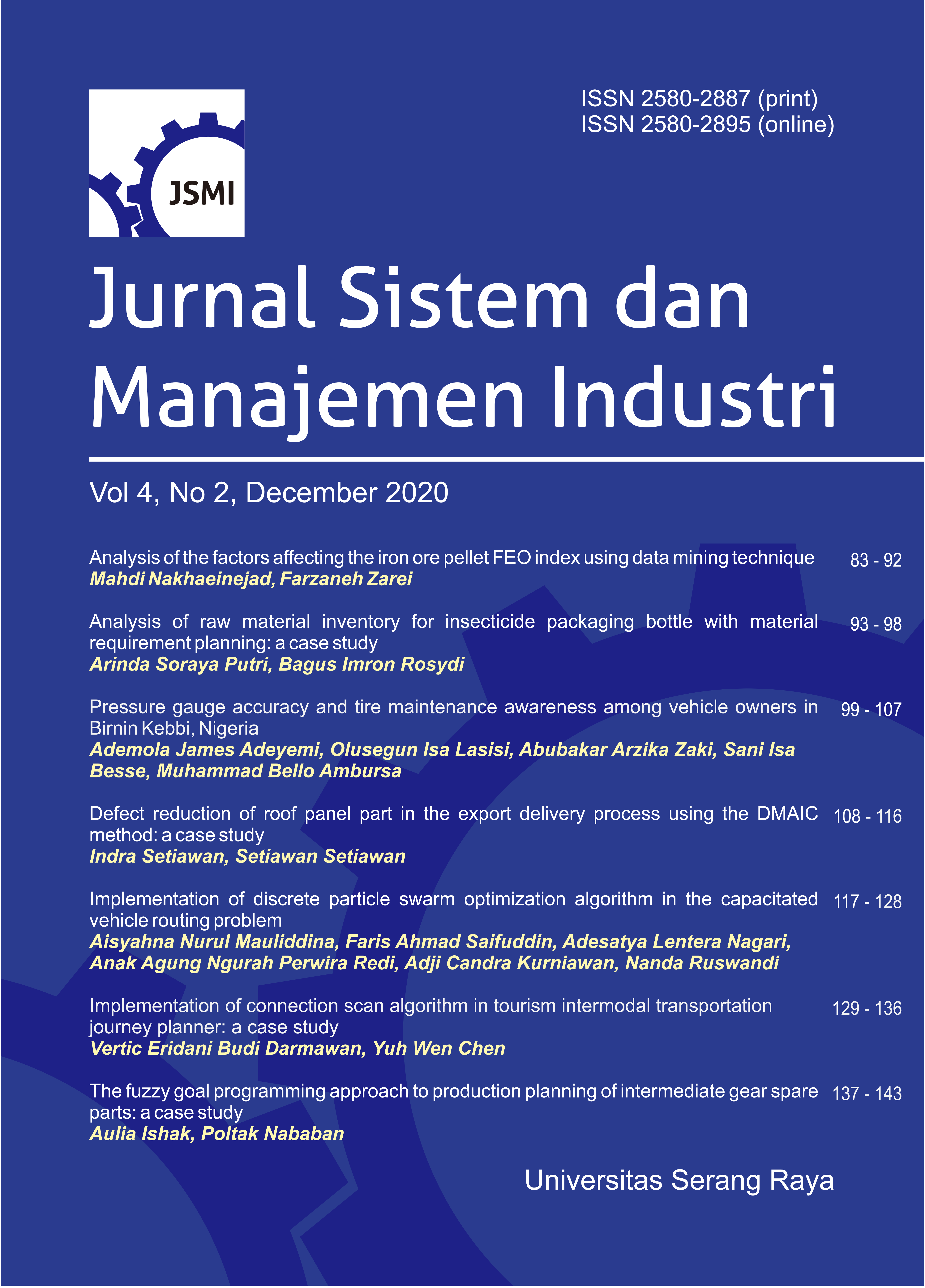Pressure gauge accuracy and tire maintenance awareness among vehicle owners in Birnin Kebbi, Nigeria
DOI:
https://doi.org/10.30656/jsmi.v4i2.2782Keywords:
Road accident, Tire blowout, Vulcanizer, Safety awarenessAbstract
Aside from human factors, tire blowouts and other tire imperfections are major contributors to the persistently high road accident rate. While tire imperfections are categorized as part of the mechanical factors affecting road accident, the tire maintenance personnel and the vehicle owners' human behavior plays a significant role in ensuring that accidents due to tire imperfections are minimized. Therefore, this study aims to determine the accuracy of the pressure gauges used by tire maintenance personnel, popularly called vulcanizers in Nigeria, and to determine the level of awareness of vehicle owners about the basic information that affects the safe use of tires on the road. The study consists of two stages. The first stage investigates the accuracy of the pressure gauges used by twenty vulcanizers in four different districts in Birnin Kebbi, the northwestern part of Nigeria. The second stage was an online survey regarding the tire maintenance behavior of 87 participants, who were formally educated from Diploma to Ph.D. level. The study's findings showed that about 25% of the vulcanizers do not use pressure gauges to measure air pressure during tire inflation, and less than 17% of the readings taken were accurate. Yet about 60% of the respondents believe that vulcanizers' pressure gauges are reliable and less than 30% of the respondents know that the expiring date of tires is four years in Nigeria. Therefore, there is an urgent need for proper awareness about tire usage and maintenance among the general population. It would also be appropriate to include such basic road safety information in the school curriculum at all levels.
Downloads
References
O. mondiale de la santé et al., World Report on Road Traffic Injury Prevention. World Health Organization, 2004. Available: https://books.google.co.id/books?id=TFw0DgAAQBAJ
E. Bun, “Road traffic accidents in Nigeria: a publichealth problem,†Afrimedic J., vol. 3, no. 2, pp. 34–35, 2012. Available: https://www.ajol.info/index.php/afrij/article/view/86571.
World Health Organisation, “Global Status Report on Road Safety 2018,†2018. Available: https://apps.who.int/iris/bitstream/handle/10665/277370/WHO-NMH-NVI-18.20-eng.pdf.
World Health Organisation, “Road traffic injuries.†2020. Available: https://www.who.int/health-topics/road-safety#tab=tab_1.
C. Uzondu, S. Jamson, and F. Lai, “Investigating unsafe behaviours in traffic conflict situations: An observational study in Nigeria,†J. Traffic Transp. Eng. (English Ed., vol. 6, no. 5, pp. 482–492, Oct. 2019, doi: 10.1016/j.jtte.2018.06.002.
A. O. Atubi, “A monthly analysis of road traffic accident in selected local government areas of Lagos State, Nigeria,†Mediterr. J. Soc. Sci., vol. 3, no. 11, pp. 47–62, 2012, doi: 10.5901/mjss.2012.v3n11p47.
S. E. Asogwa, “Road traffic accidents in Nigeria: A review and a reappraisal,†Accid. Anal. Prev., vol. 24, no. 2, pp. 149–155, Apr. 1992, doi: 10.1016/0001-4575(92)90031-D.
C. Venkatraman, O. Olowu, D. Turkmani, L. Hynan, and F. E. Nwariaku, “Decreasing Trends in Road Traffic Injury Incidence and Mortality in Nigeria: A Ten-Year Analysis,†J. Surg. Res., vol. 249, pp. 163–167, May 2020, doi: 10.1016/j.jss.2019.11.033.
V. N. Ukoji, “Trends and patterns of fatal road accidents in Nigeria,†Violence in Nigeria: A qualitative and quantitative analysis. African Studies Centre, Leiden, pp. 13–40, 2016. Available: http://www.ifra-nigeria.org/publications/e-papers/69-ukoji-vitus-n-2014-trends-and-patterns-of-fatal-road-accidents-in-nigeria-2006-2014.
National Bureau of Statistics, “Road Transport Data 2019,†2020. Available: https://www.nigerianstat.gov.ng/pdfuploads/Road_Transport_Data - Full Year 2019.pdf.
O. A. Egaji, S. Chakhar, and D. Brown, “An innovative decision rule approach to tyre pressure monitoring,†Expert Syst. Appl., vol. 124, pp. 252–270, 2019, doi: 10.1016/j.eswa.2019.01.051.
K. Chen and C. Yeh, “Preventing Tire Blowout Accidents : A Perspective on Factors Affecting Drivers ’ Intention to Adopt Tire Pressure Monitoring System,†Safety, vol. 4, no. 16, pp. 1–14, 2018, doi: 10.3390/safety4020016.
S. Lu et al., “Active rectifying control of vehicle with tire blowout based on adaptive fuzzy proportional–integral–derivative control,†Adv. Mech. Eng., vol. 11, no. 3, pp. 1–13, 2019, doi: 10.1177/1687814019835108.
C. Daly, “Avoiding tire-related vehicle crashes,†Fire Eng., vol. 160, no. 2, pp. 1–10, 2007. Available: https://www.fireengineering.com/wp-content/uploads/content/dam/fe/online-articles/documents/FEU/FEU_2_09.pdf.
N. T. Ratrout, “Tire condition and drivers ’ practice in maintaining tires in Saudi Arabia,†Accid. Anal. Prev., vol. 37, pp. 201–206, 2005, doi: 10.1016/j.aap.2003.03.001.
R. P. Chukwugozi, “An Analysis of Vehicle Tyres Usage and Failures on the Highways : Towards Safe Driving in Ondo , Nigeria,†Civ. Environ. Res., vol. 8, no. 10, pp. 1–6, 2016. Available: https://iiste.org/Journals/index.php/CER/article/view/33332.
M. A. Hassan, M. A. A. Abdelkareem, M. . Moheyeldein, A. Elagouz, and G. Tan, “Advanced study of tire characteristics and their influence on vehicle lateral stability and untripped rollover threshold,†Alexandria Eng. J., vol. 59, no. 3, pp. 1613–1628, Jun. 2020, doi: 10.1016/j.aej.2020.04.008.
B. Szczucka-Lasota, J. Kaminska, and I. Krzyzewska, “Influence of tire pressure on fuel consumption in trucks with installed tire pressure monitoring system,†J. Silesian Univ. Technol. Ser. Transp., vol. 103, pp. 167–181, 2019. Available: http://sjsutst.polsl.pl/archives/2019/vol103/167_SJSUTST103_2019_SzczuckaLasota_Kaminska_Krzyzewska.pdf.
A. Silva, J. R. Sánchez, G. E. Granados, J. C. Tudon-Martinez, and J. de J. Lozoya-Santos, “Comparative Analysis in Indirect Tire Pressure Monitoring Systems in Vehicles,†IFAC-PapersOnLine, vol. 52, no. 5, pp. 54–59, 2019, doi: 10.1016/j.ifacol.2019.09.009.
F. Wang, H. Chen, L. Guo, and Y. Hu, “Predictive safety control for road vehicles after a tire blowout,†Sci. China Inf. Sci., vol. 61, no. 7, p. 70209, Jul. 2018, doi: 10.1007/s11432-017-9330-6.
F. . Jegede, “Spatio-temporal analysis of road traffic accidents in Oyo State, Nigeria,†Accid. Anal. Prev., vol. 20, no. 3, pp. 227–243, Jun. 1988, doi: 10.1016/0001-4575(88)90007-3.
S. E. Vollset et al., “Fertility, mortality, migration, and population scenarios for 195 countries and territories from 2017 to 2100: a forecasting analysis for the Global Burden of Disease Study,†Lancet, vol. 396, no. 10258, pp. 1285–1306, Oct. 2020, doi: 10.1016/S0140-6736(20)30677-2.
Downloads
Published
Issue
Section
License
All articles in Jurnal Sistem dan Manajemen Industri can be disseminated provided they include the identity of the article and the source of the article Jurnal Sistem dan Manajemen Industri. The publisher is not responsible for the contents of the article. The content of the article is the sole responsibility of the author
Jurnal Sistem dan Manajemen Industri is licensed under a Creative Commons Attribution-NonCommercial-ShareAlike 4.0 International License.





















